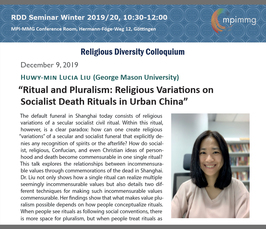"Ritual and Pluralism: Religious Variations on Socialist Death Rituals in Urban China”
- Datum: 09.12.2019
- Uhrzeit: 10:30 - 12:00
- Vortragende(r): Huwy-min Lucia Liu (George Mason University)
- Huwy-min Lucia Liu is an Assistant Professor in the Depart-ment of Sociology and Anthropology at George Mason University in the United States since 2019. Before joining Mason, she was an Assistant Professor in the Division of Humanities at Hong Kong University of Science and Technology. Dr. Liu received her PhD from the Anthropology Department at Boston University in 2015. Dr. Liu is a cultural anthropolo-gist whose research interests cover topics in politics, religions, socialism and change, subjectivity and governance, life and death study, rituals, and emotion. She is currently working on a book tentatively titled, Governing Death, Making Persons: The New Chinese Way of Death.
- Ort: MPI-MMG, Hermann-Föge-Weg 12, Göttingen
- Raum: Conference Room

For more details please contact vdvoffice(at)mmg.mpg.de.
The default funeral in Shanghai today consists of religious variations of a secular socialist civil ritual. Within this ritual, however, is a clear paradox: how can one create religious “variations” of a secular and socialist funeral that explicitly denies any recognition of spirits or the afterlife? How do socialist, religious, Confucian, and even Christian ideas of personhood and death become commensurable in one single ritual?
Dr. Liu not only shows how a single ritual can realize multiple seemingly incommensurable values but also details two different techniques for making such incommensurable values commensurable. Her findings show that what makes value pluralism possible depends on how people conceptualize rituals. When people see rituals as following social conventions, there is more space for pluralism, but when people treat rituals as making personal testimonies, the possibility for pluralism decreases. This talk explores the relationships between incommensurable values through commemorations of the dead in Shanghai.